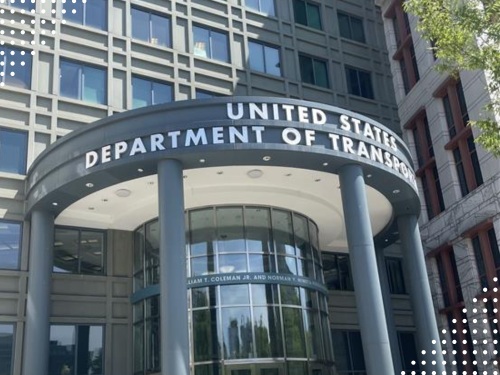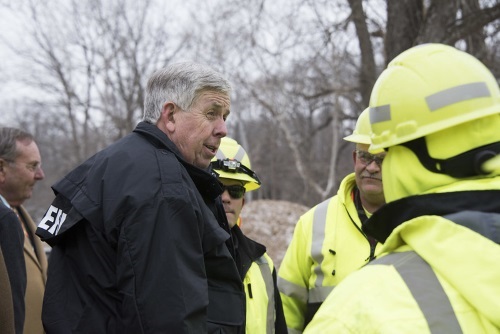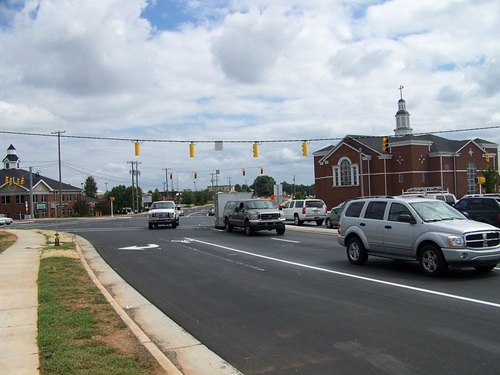Out of the 11 state governorships up for election in 2020, incumbents seeking re-election won nine of them – six of them Republican and three Democrat – with two open seats captured by Republican candidates.
[Above photo of Gov. Mike Parson (R) by MoDOT.]
Meanwhile, voters in 18 states approved a record 94 percent of state and local transportation-focused ballot initiatives so far, providing an additional $14 billion in one-time and recurring revenue for transportation improvements throughout the country, according to an analysis by the American Road & Transportation Builders Association.

Results are still pending for 13 measures, but the analysis by ARTBA’s Transportation Investment Advocacy Center indicates voters approved 303 of 322 transportation-focused ballot initiatives – the highest approval rate in the 20 years ARTBA has been tracking initiatives.
Altogether, those 303 approved 2020 measures will support $12.7 billion in new transportation investment revenue and $1.3 billion in continued funding through tax extensions, renewals or protections, the group said.
Where the governorship races are concerned, according to a variety of news reports, incumbents who successfully won re-election include:
- Doug Burgum (R) won re-election to a second four-year term as governor of North Dakota.
- John Carney (D) won re-election as Delaware’s governor to a second four-year and final term.
- Roy Cooper (D) won re-election to a second and final four-year term as governor of North Carolina.
- Eric Holcomb (R) won re-election to a second four-year term as governor of Indiana. According state law, he is limited to serving a total of eight years in any 12-year period, equivalent to two full terms.
- Jay Inslee (D) won election to a third four-year term as governor of Washington State. He is not term-limited.
- Jim Justice (R) won re-election to a second four-year and final term as governor of West Virginia. Originally elected governor in 2016 as a Democrat, Justice changed party affiliation in 2017 and is now the first elected Republican governor of West Virginia in 24 years.
- Mike Parson (R) won re-election to a full four-year term as Missouri’s governor.
- Phil Scott (R) won re-election to a third two-year term as governor of Vermont. He is not term limited.
- Chris Sununu (R) won re-election to a third two-year term as governor of New Hampshire. He is not term limited.
In Utah, the first of two open governorship seats in this election cycle, current Lieutenant Governor Spencer Cox (R) won election to a four-year term as governor. He replaces Gary Herbert (R), who chose not to seek re-election after serving as Utah’s governor for more than 10 years.

In Montana, Greg Gianforte (R) – who previously served in the House of Representatives – won election to a four-year term as the state’s first Republican governor in 16 years. He replaces Steve Bullock (D) who served two-terms as governor and who lost a Senate election bid this year.
In terms of state and local transportation-focused initiatives on the 2020 ballot, major victories include the approval of Issue 1 by Arkansas voters, which allows for the continuation of a half-cent sales tax measure to fund transportation infrastructure projects.
Originally approved by voters in 2012, the measure to extend the half-cent sales tax passed with a 55 percent to 45 percent margin, according to ARTBA, and should raise approximately $205 million annually for state highways and $44 million annually for localities.

“The passage of Issue 1 is truly a victory for the state of Arkansas,” explained Lorie Tudor, director of the Arkansas Department of Transportation, in a statement.
“The continued investment and progress in our roads will increase safety and mobility and provide economic opportunities for generations to come,” she added.
Other major wins and losses for transportation ballot measures this election cycle include:
- Voters in Bend, Oregon, passed a $190 million transportation bond measure to pay for a range of transportation capital projects, including $7 million for public transit.
- Meanwhile, voters in Portland, Oregon, rejected a 0.75-percent payroll tax on employers that would have provided $7 billion in funds for 150 transportation projects, including the TriMet Southwest Corridor Light Rail Project. The failure of that tax initiative equates to a “pause button” on that TriMet light rail project, experts said.
- Voters in Austin, Texas, passed Proposition A to help fund the $7 billion Project Connect transit expansion effort. That ballot measure increases property taxes and dedicates 8.75 cents per $100 of the city’s operations and maintenance portion of the tax rate to the transit system.
- In California, voters passed Proposition 22, exempting Uber and Lyft rideshare drivers plus other “gig economy” companies from a previously enacted California law, AB5, which went into effect in January. Proposition 22 prevents gig companies from having to classify independent contractors as employees, avoiding associated benefits costs.
 Top Stories
Top Stories


